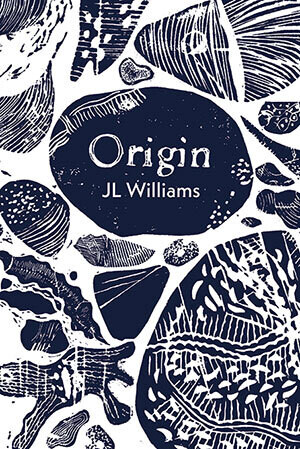Origin
JL Williams
(Shearsman Books, 2022); pbk: £10.95
Motherhood, birth, and parental relationships are the three key components that make up JL Williams’ collection Origin. She explores all sides of what it means to be a mother: the pain of birth, raising a child when your own parents are absent, the fear of being in charge of another person’s life and their survival. Williams takes us into the depths of her psyche in all the stages of her pregnancy. We not only see her own fears of motherhood but our shared fears over bringing up a child in today’s society.
The collection opens with her title poem ‘Origin’. This poem sets a marker for what is to come. She writes,
out of chaos a voice
greets you tender in the womb
as a mother does loving
already your ability to smile[.]
A chaotic world surrounding this fragile baby is blocked out straight away by the mother’s love — her own power as a mother pitted against the fierce anarchy of the outside world. The baby is still able to break through and smile. We know that whilst Williams intends to take us on this emotional journey, at the end of the day there will always be the unbreakable bond between mother and child.
The collection then breaks into two larger sections: ‘Glimpse’ and ‘Mother Virus’. ‘Glimpse’ covers all Williams’ thoughts throughout her pregnancy. One poem that I found particularly interesting was ‘I Never Wanted a Child’. This prose-poem not only opens up about the narrator’s abusive stepfather but addresses the pressure women face to have a child. In a collection predominately about motherhood, Williams addresses femininity as not defined just by reproduction, or being a mother. It allows her to reach into a deeper, more taboo subject within motherhood.
I still feel the identities of child-free woman and child-less woman within
me…Because those women are strong and brave[.]
She allows us to see the courage in not having a child – whether through choice or inability. She is aware that Motherhood might be as much an ideology as just being a parent.
Additionally, in ‘Glimpse’, Williams runs a series of different journal-like poems (’19 April 2019, Edinburgh’, ’12 June 2019, Paxos’, etc) written during her pregnancy. The sequence allows her to bring intimate and raw emotion to the surface level of her poetry. . The beauty of ‘30 September 2019, Edinburgh’ lies in the idea that no matter the state of our current climate, at the end of the day, she will have her baby and their two lives will be forever interwoven. Her survival becomes the most important part of her life – for her survival becomes that of her baby’s too.
Each breath I take is for you – a reminder
that joy is possible, that there is a reason to survive.
Turning to the latter half of the collection, ‘Mother Virus’ shows us not only the taxing aftermath of labour but the wonder at a child’s naivety. ‘The Hand’, brief both in its form and action, shows her baby’s discovery of its own hand.
also there is an element
of a lover’s amazementin the gaze of the baby noticing,
for the first time, her hand.
There is beauty in a child’s admiration of things that we see as simplistic or straight-forward in ‘First and last most perfect sound’:
this morning you felt with your bare feet
for the first time the pile of carpetand laughed your halcyon laugh
which echoed[.]
Origin becomes more than just the beginnings of our lives and the livelihood of mothers, but it reminds us that whilst the world around us may be changing (whether for better or for worse), we will always be taken back to the simple beauty that humans behold.
Amy Turnbull


Leave a Reply